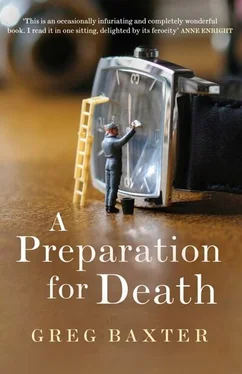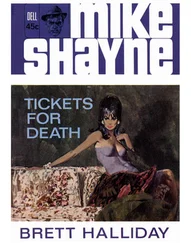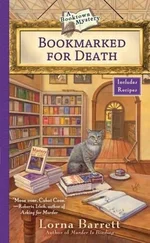I met Clare for dinner on Dame Street. I came straight from class, which had run twenty minutes late. I felt bad, but had forgotten that Clare likes moments on her own. She hadn’t even noticed. The weather was grey again, and when the late-lit nights in summer are full of uncertain rain — rain that begins when you take your hood down, and stops when you lift it up — and gusts of wind, and suddenly cool again, the city has the feel of apocalypse about it.
When I arrived at the restaurant — a small and deliberately untidy spot that serves big cheap archetype mains: lamb stew, roast chicken, beef Bourguignon — Clare was seated at the very back, in an emerald-green top and an amber-coloured costume necklace, hair pulled back, reading. I was badly ravelled — none of my thoughts would dissipate, or retreat into unconscious space. It is always like this. They sardine together in a room and speak at the same volume. So she spoke about herself for a while and I listened. She had been working at a conference all week — hundreds of countries had gathered to ban cluster bombs. This seemed more important than my headache. I drank some wine. Slowly I came out of myself, and it was wonderful to be eating dinner in the city on a weeknight. And all the better since I could not afford it. The restaurant emptied. It grew dark, finally, and began to rain with equanimity.
After dinner, we went to a Russian wine bar on Wicklow Street. I’d been on beer heavily for the previous three nights and could not fit any more bubbles. Inside, there was a man playing muzak on a saxophone, sad and sexy versions of Europop. There was a tall woman with a beautiful and skinny body, but then we saw that she was not at all pretty. Next to us, an old foreign man began singing to his female companion. She inched away from him, and he swallowed her up in his arms. His mouth was so wide open as he sang that I thought he might try to fit her head inside it, and eat her like a snake eats a rat.
When the wine was finished, we walked to Clare’s flat, which she shares with another girl. It is tiny, clean but city-centre-grimy — old carpets, mildew in the bathroom, gunk in the sink, the smell of rental living. The ceilings are low, the windows are single-glazed. I feel thoroughly pleased by it, thinking of what is to become of me, once I sell the house. Weak showers. Small, squeaky beds. Ice-cold rooms in winter, sleeping by electric heaters. A room with a small desk. My books will overcrowd the room.
Clare’s room, which is a yellow rectangle, has interesting but forgettable prints on the walls, a bookshelf that is neatly decorated with things she has gathered on her travels and a great deal of costume jewellery, a small bed beside which are piled the many new books she has bought in a jagged and unstable chimney stack. There is a mirror beside her bed, in front of which she does her make-up, and in which I am always watching ourselves in bed — I love to watch the way she desires to be fucked, her at-homeness in desire. Nothing is beyond her. I wish we were in love. Her closets are so overstuffed with outfits and coats that she must hang things everywhere. But she spends very little time in her apartment, only to sleep, bathe, and watch videos. She likes to read outdoors, or in pubs, and eat in inexpensive cafés. She lives in the city. She takes up all of it.
My house is tall and narrow. The bottom two floors are like the bowels of a ship. Everything is tight and poorly lit. I don’t even use the bedroom on the first floor, which was — what a long time ago that seems, but only a year — my study. Now it holds a few books, some winter coats, and an American football. The second floor has two bedrooms, one — mine — an ensuite, and a large bathroom, which is Helen’s, but I shave there, since my bathroom lacks a mirror. My bedroom is large, but so is the bed, so there is not much room. There are some old papers and a cluttered closet where nothing is folded, merely thrown in bunches gathered off the clothes horse. I have a few books stacked on the window sill. The shower has no shield — just a box cut out of the wall. The bathroom floor is streaked with stains and dirt. The sink is festering in soap scum. The toilet is filthy.
My bosses think I hide behind apathy, and that is why I’m going nowhere in journalism. But it is through apathy that I endure journalism.
It has become the understood thing that no one can live by his talents or knowledge who is not ready to prostitute those talents and that knowledge to betray his species, and prey upon his fellow man. [Hazlitt]
I will squander whatever I can make of journalism.
In the evenings, teaching, my apathy becomes mania. It is like my skin is yanked inside out. My repudiation finds something worth talking about, and is armed with the pieces of writing I give to students to read, salvos that, momentarily, reverse the flow of civilization: Gogol, Maupassant, Dostoevsky, Chekhov, Schulz, Kafka, Borges, Conrad, Augustine, Baldwin, Orwell, Woolf, Faulkner, Bunin, Miller, Seneca, Plutarch, Kharms, Tanizaki, Lu Hsun, Kenko, Nietzsche, Mansfield, Cioran, Montaigne. Whatever society degrades, a genius ennobles; whatever society embraces, a genius obliterates. It makes my heart clamour now just to think of them. We gather around a few mismatched tables in a small, green-grey second-floor room with windows that look south over the gravity of excess and wealth. We are the enraptured state of failure.
But here I am talking about geniuses, and savages, at midnight, at my dining-room table, drinking tea, wearing two jumpers because it is cold again and has rained all day.
After a short heatwave that had everyone in T-shirts and lunching on the Liffey boardwalk, the city grew cool and grouchy. Coats and umbrellas returned. For two days the drop in temperature brought the most fantastic heavy fog into the city. It altered the nature of everything. Pedestrians, cars, motorcycles — they were all like ghost ships. The tops of buildings evaporated. And in this reorganization my acuity became so over-enhanced that every image, every sound, became the overflowing bulk of the proof and contradiction of the proof of perception, of the act of perceiving, and the solidity and liquidity of meaning. And I wanted nothing from this equilibrium but to live in it for a while.
The fog broke in the late evening of the second day. After class I skipped drinks to bus home and get some sleep. At a quarter past nine there was still a lot of muted daylight. But it seemed to come from nowhere. We rumbled up the Malahide Road in a torpor. I put away the assignments I was trying to mark and turned my music up very loud — Piaf. What an ability to render herself. I don’t understand a word of it. I don’t want to.
Clare and I came to my house after abandoning a Saturday night early — we had been kissing in crowded bars and when I lifted her dress in a half-crowded alleyway and pulled the crotch of her underwear to one side, she decided it was time to go. She was in a soft and tight blue-and-white dress with long sleeves and a low neck. Every time I see her she is wearing a new outfit — she has a great knack for finding unusual things that look good on her. She tells me she can go a year without wearing the same thing twice. And I have seen her room, which is like a wardrobe closet on a movie set, so I believe her. We got a taxi and I put my hand up her dress and she closed her eyes and spread her legs open and leaned her head back, and the taxi man saw this without really looking; after a few minutes of politenesses he shut up. I moved her underwear and put a finger inside her. She was very wet, and the smell of her filled the taxi. The driver opened a window. My mind had opened like a large mouth. Blind and bottom-feeding.
Читать дальше












